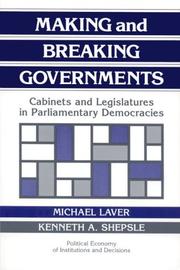| Listing 1 - 3 of 3 |
Sort by
|

ISBN: 0521438365 0521432456 0511625677 0511882076 9780521438360 9780521432450 9780511625671 Year: 1996 Publisher: Cambridge: Cambridge university press,
Abstract | Keywords | Export | Availability | Bookmark
 Loading...
Loading...Choose an application
- Reference Manager
- EndNote
- RefWorks (Direct export to RefWorks)
Making and Breaking Governments offers a theoretical argument about how parliamentary parties form governments, deriving from the political and social context of such government formation its generic sequential process. Based on their policy preferences, and their beliefs about what policies will be forthcoming from different conceivable governments, parties behave strategically in the game in which government portfolios are allocated. The authors construct a mathematical model of allocation of ministerial portfolios, formulated as a noncooperative game, and derive equilibria. They also derive a number of empirical hypotheses about outcomes of this game, which they then test with data drawn from most of the postwar European parliamentary democracies. The book concludes with a number of observations about departmentalistic tendencies and centripetal forces in parliamentary regimes.
Government --- Cabinet --- Cabinet officers. --- Cabinet system. --- Cabinet officers --- Cabinet system --- Comparative government --- Representative government and representation --- #SBIB:324H40 --- Parliamentary government --- Political representation --- Representation --- Self-government --- Constitutional history --- Constitutional law --- Political science --- Democracy --- Elections --- Republics --- Suffrage --- Comparative political systems --- Comparative politics --- Government, Comparative --- Political systems, Comparative --- Cabinet government --- Cabinet ministers --- Ministers of State --- Secretaries of State --- Public officers --- Politieke structuren: algemeen --- Comparative government. --- Representative government and representation. --- Ministres --- Institutions politiques comparées --- Gouvernement représentatif --- Social Sciences --- Political Science
Book
ISBN: 9780393138191 Year: 2012 Publisher: New York (N.Y.) Norton
Abstract | Keywords | Export | Availability | Bookmark
 Loading...
Loading...Choose an application
- Reference Manager
- EndNote
- RefWorks (Direct export to RefWorks)
Book

ISBN: 9780674038578 Year: 2009 Publisher: Cambridge, MA
Abstract | Keywords | Export | Availability | Bookmark
 Loading...
Loading...Choose an application
- Reference Manager
- EndNote
- RefWorks (Direct export to RefWorks)
| Listing 1 - 3 of 3 |
Sort by
|

 Search
Search Feedback
Feedback About UniCat
About UniCat  Help
Help News
News